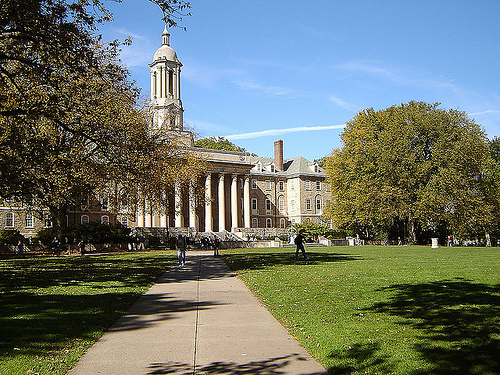by Muhammad Saad Khan
When we talk about quality employment and best employee, then the first thing which came up in any employer’s mind is that their incumbent would be highly qualified and his qualification is legitimate.
Legitimacy of education is becoming a very intense issue these days as there are many people trying to get their credentials faked out to get their desired job. As the recession hit all around the globe and the job market is so scarce, and the qualified employee needs are so high, so many people are using bad means to get their education.

There are number of diploma mills and degree mills, offline and online which are providing the best criminal services to the people and making money like never before. They are actually selling fake degrees, diplomas and certifications. Which have no worth as now every single employer is running a comprehensive education background check to vet their education authenticity.
Verifying the education credentials of a potential candidate can be an important part in identifying if they have the suitable skills set for the position. Educational success reveals a great deal about an applicant’s credentials and motivations; and through education background checks, an employer can get an accurate depiction of their qualifications.
Many employers view particular educational qualifications as a key factor in seeking new employees. Moreover, education is a prerequisite for many positions because it ensures applicable knowledge of a subject matter, or more importantly, a required license for the position.
Studies show that approximately 30% of all applicants puff up information about their educational background, ranging from made‐up degrees from legitimate schools to insignificant degrees from diploma mills.
In 2004, the general Accounting Office revealed that nearly 200,000 federal employees had at the very least exaggerated education credentials on their resume.
SHRM(Society for Human Resource Management): More than 53% of job applicants falsify information on their resumes; one in four candidates misrepresents his educational attainment.
ADP Hiring Index: 49% of employment, education and or credential reference checks reveal discrepancies in the applicant’s information.
Association of Certified Fraud Examiners: 41% of applicants lie about their education.
The above trend indicates an increase in the likelihood that employer’s who don’t verify education will hire unqualified personnel. Hiring unqualified personnel, in turn, leads to higher employee turnover, forcing the organization to incur expensive recruiting and replacement costs.
Online Degree Scams: Diploma Mills and Fake Degrees
It has also become exceedingly easy to access an authentic looking, knock‐off diploma from any school in America; all you need is a credit card and a computer. Diploma mills and degree mills as well as various websites, advertise very realistic, physical diplomas and transcripts, which have been found to deceive many employers.
Therefore, with the striking statistics of resume fraud, employers should think twice about using physical diplomas as proper evidence of a degree. Because the requirement for education qualification has become so demanding, education fraud is becoming more prevalent, as are the establishments of diploma mills.
Consequently, in order to combat education fraud, laws have recently been passed in which companies who manufacture fake degrees and diplomas are considered to have committed a Misdemeanor, unless the degree explicitly states, “for novelty purposes only.”
Current Systems of Education Background Checks and Degree/ Diploma Verification and Why They Are Not Enough!
- At present, human resource departments in companies directly contact the concerned educational institution and undertake verification. This is no longer a viable solution, considering the increase in the number of recruitments, and the time taken for verification. This is also not a fool proof method.
- A second method, often adopted by many of the larger corporations, is to outsource their employment verifications to background screening companies, who maintain large personnel databases.
- The third system which has developed recently in education background checks is the system of online degree and diploma verification. There is a database of fake colleges and universities and as well as the misdemeanors who faked their documents in past. It is now the best free online resource for the employers as well as for the students, who can check their institutions as well.
The biggest issue with targeting these diploma mills is that they frequently move around. Many diploma mills are constantly changing their names while others are sprouting up sporadically. There are currently hundreds of diploma mills on the internet that offer fake degrees and diplomas.
When posing as legitimate institutions, diploma mills will use catchy phrases to attract potential buyers:
• Here is an opportunity to get ahead
• University diplomas
• Obtain a prosperous future, money earning power, and the admiration of all
• Diplomas from a prestigious university
• Based upon your present knowledge and life experience
• No required tests, classes, books or interview
• Bachelors, masters, MBA, and doctorate (PhD) diplomas available in your field of choice
• No one is turned down
• Confidentiality assured. Call now to receive your diploma within days
• Furthermore, these “schools” have no faculty, no classes, and no course catalog and only have one address or email in which they can be contacted.
Concluding Remarks:
- Falsified education credentials have become a serious issue in the workforce; it breaches the faith on employees who are involved, especially when it can directly affect other employees and the company as a whole. It is also a serious blunder on the part of the employer who should have done proper education background checks; a mistake that could essentially hinder their current position.
- Now that up to 20% of employers in America require a diploma or degree from a college or university that awarded it to them, education background checks have become exceptionally crucial.
- Although a federal law has been implemented to target diploma mills that give out phony diplomas, the problem still exists and is far from being corrected. In the meantime, employers should remain steadfast about conducting pre‐employment background checks that include verifying academic credentials.
- The online diploma/degree mill checking systems are significant source of help to the employers looking for easy and free of cost education background check.
- Education background checks should be included in every pre‐employment screening process.

 Follow
Follow









 The FTC decided Social Intelligence complies with the Fair Credit Reporting Act, the same set of rules that keeps your bill-payment records on file with the consumer bureaus for seven years, according to
The FTC decided Social Intelligence complies with the Fair Credit Reporting Act, the same set of rules that keeps your bill-payment records on file with the consumer bureaus for seven years, according to 